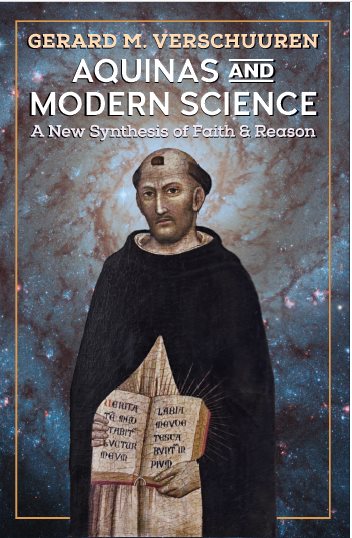
| “I was impressed by the author’s knowledge of science and his insights into its perfect compatibility with Thomas’ commonsense principles. I was also impressed by his ability to translate the technical abstractions of both philosophy and science into the language and thought processes of ordinary intelligent laymen.”
— Peter Kreeft,
Professor of Philosophy, Boston College, MA
|

| "Dr. Verschuuren makes very clear the perennial value of Aquinas if one seeks an understanding of the nature of scientific explanation. Natural science rests on an assumed set of philosophical principles. This book is a clear exposition of the first principles of thought and being, as identified and defended in the work of Aquinas."
— Jude P. Dougherty,
Dean Emeritus of the Department of Philosophy,
Catholic University of America, Washington, DC
|

| "Dr. Verschuuren has written an informative, thought-provoking, witty and irresistibly readable brief for the continuing relevance of Aristotelian-Thomistic philosophy to modern science.
He is at home in both worlds, and can explain them clearly to those who are not."
— Stephen M. Barr
Professor in the Department of Physics and Astronomy
Director of the Bartol Research Institute
Researcher in theoretical particle physics
University of Delaware
|

| "First, the book is for college students a readable and comprehensive introduction to the thought of Aquinas. Many times I wondered if the author were going to mention this or that Thomistic idea, and sure enough up it came. I was not disappointed once. Second, the book is a treasure house of significant and insightful integrations with sciences to which these students would have already been exposed. More importantly, what the author does so well is to provide a clear example of what any current Thomist should be trying to do – talk to one’s contemporaries."
—
John F.X. Knasas,
Professor of Philosophy, Center for Thomistic Studies,
University of St. Thomas, Houston, TX.
|

| "Verschuuren here provides a thoughtful account of how the philosophical vision of Aquinas can help us better to see the unity of reality and to appreciate the wide range of scientific disciplines that study widely diverse aspects of reality. The book includes well informed discussion of such technical issues as the indeterminacy problem in microphysics and the concept of randomness in evolutionary biology. For each issue Verschuuren brings to bear the resources of Thomistic philosophical method, clearly explained."
—
Joseph W. Koterski , S.J.,
Associate Professor of Philosophy,
Fordham University, New York
|

| "Verschuuren has written a great book on this. The knowledge he brings is highly impressive. He has a great love of Aquinas and familiarity with him and his metaphysics, yet also looks to be highly read in the scientific literature.
Verschuuren gives us an introduction to the metaphysics that is simple enough for the layman to understand."
—
Nick Peters,
of Deeper Waters Christian Ministry
|
Interview with Nick Peters about the book Aquinas and Modern Science.
|
"Indeed, this book is a fabulous introduction to Thomistic thought and Verschuuren does a wonderful job of suggesting applications to a variety of different fields. This breadth is very helpful—there is something in this book for everybody, no matter their area of interest. I do think Verschuuren makes a strong case for the relevance of Aquinas’s thought to modern day scientific pursuits, especially how the latter’s philosophical categories can help us examine the underpinnings of our fields."
|
"Gerard Verschuuren ... demonstrates that Aquinas's thought can be fruitfully applied to contemporary scientific discoveries to help us understand them in a more integrated fasion.... [This integration] is a welcome remedy to the disintegrative tendencies of the modern university, which fractures reality by placing the facts of science in opposition to wisdom.... Verschuuren’s concise integration makes for fine textbook for a philosophy of science course, or for anyone looking to discover a vision of reality that can thoughtfully interpret the increasingly complex modern sciences."
|
"The book is well researched, and the writing style is accessible yet academically rigorous, it also contributes to the field of apologetics, dispelling myths from within Church history and passionately defending the intellectual contribution of St. Thomas towards advances in Western Civilisation."
|
"this book will serve well as an introduction to the fascinating, extremely important question of the intersection of Thomas’s philosophy and the contemporary sciences."
|
"the project offered by Verschuuren provides an intriguing and valuable contribution to the revival of Thomism and an attempt to bring it into a conversation with the contemporary science."
|


5. AQUINAS AND THE SCIENCES a. Aquinas the Scientist? b. The Power of Reason 6. AQUINAS AND COSMOLOGY a. A Beginning of the Universe? b. Before the Big Bang? c. Creation ex nihilo? 7. AQUINAS AND PHYSICS a. Classical Physics b. Quantum Physics 8. AQUINAS AND GENETICS a. Causa Materialis of DNA b. Causa Efficiens of DNA c. Causa Formalis of DNA d. Causa Finalis of DNA e. Causa Exemplaris of DNA 9. AQUINAS AND EVOLUTIONARY BIOLOGY a. The Causality of Evolution b. Intelligent Design? c. The Path of Evolution 10. AQUINAS AND NEUROSCIENCE a. The Mental is Not the Neural b. What then is the Mental if Not Neural? c. Can the Soul Exist Without the Body? 11. AQUINAS AND SOCIAL SCIENCES a. Sociology b. Economics c. Political Sciences 12. INDEX






